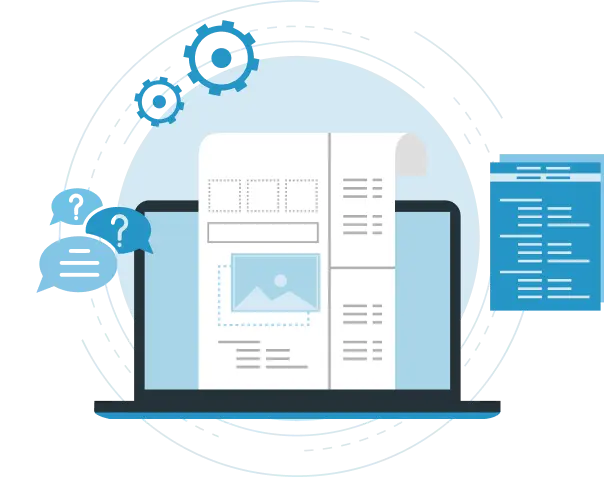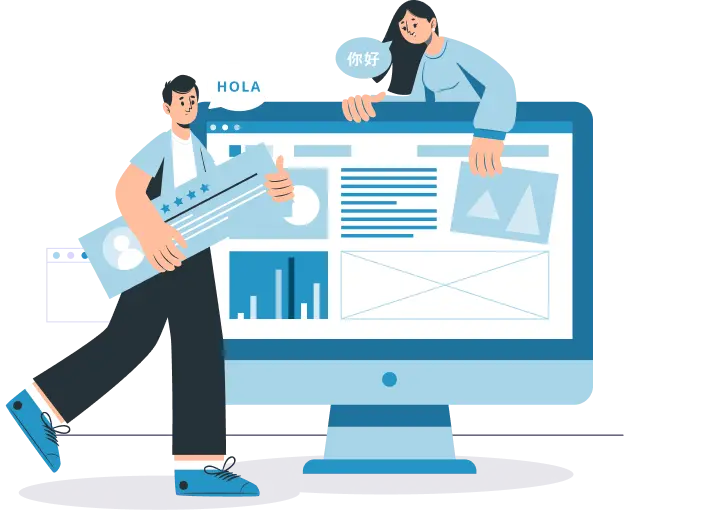
What Is A Desktop Publishing Service (DTP)
In desktop publishing, the main goal is to translate a document into different target languages while preserving the graphics, layout, and formatting of the original manuscript. This step is oftentimes performed at the end of a translation project and adds the final touches to make the content attractive, easy to use, and ready for publication.
Common documents that require professional desktop publishing services include flyers, brochures, magazines, newsletters, instruction manuals, user guides, product catalogs, annual reports, presentations, and more.
Why Desktop Publishing Matters
When a document is translated from one language to another, text expansion or contraction is a prerequisite. So, the translated version could have a different layout and formatting compared to the source document. For instance, paragraph breaks and spacing might be changed. Moreover, the bulleted lists might not line up properly.
This leads to giving your customers, clients, partners, and other stakeholders a poor first impression when they see your document(s). That’s why multilingual desktop publishing matters a lot.
A good LSP with DTP translation services would help you reproduce a document in any language while retaining the original visual impact – every time.

Formats we support
We’re a leading desktop publishing company that can work with all types of documents using a wide range of desktop publishing tools, such as:
Our Multilingual Desktop Publishing Services
Our DTP translation services will transform your content into your target language while customizing the visual elements to keep the original format intact.

Document Conversion

Image Localization

Text Adjustment

Scanned to Digital

Layout & Formatting

Presentations
Document Conversion
Our DTP experts have developed automatic document converters that enable fast, effective, and user-friendly conversions. We strive to make this process as simple as possible. We understand that each type of document – such as a brochure, ebook, user guide, etc. has different visual requirements and we ensure that each of them is converted by keeping the specified format. Final checks are done and every project is thoroughly reviewed by a dedicated project manager to ensure seamless conversion.
Image Localization
We have skilled and experienced professionals on our team for first-class desktop publishing translation. The scope of our DTP services includes localization of all the visual content in accordance with the cultural preferences of your target market. We prepare your content for both print and digital environments and tailor the visuals including images, colors, and logos to provide your users with a personalized experience.
Text Adjustment
Text length often changes drastically when translating a document between different languages. This breaks the visual layout of the text. For instance, if your advertising copy or brochure has 10 lines in English, its translated version in German can occupy more lines due to text expansion. So, if you want to adjust your document design in a way that resonates with the target market, you need our multilingual DTP services.
Scanned to Digital
We use a combination of OCR technology and our valued human services in order to stand true to our mission of taking care of all your personalized needs. If you want your scanned copies converted into digital ones for online use, our DTP company has got you covered. We convert your scanned copies into user-friendly and easy-to-read digital documents. No matter how extensive your project is, we fulfill your specific requirements and complete the projects always on time.
Layout & Formatting
Our language services offer top-rated DTP services for your customized preferences. Whether you need multilingual content for printing or digital use, our DTP experts will prepare your documents by paying special attention to font size, typography, spacing, and all other flavors of the required layout. We will ensure that every copy of your content is formatted appropriately. Besides, if you request any changes, we will willingly incorporate those and guarantee complete satisfaction.
Presentations
Are you creating presentations for professional purposes? Does design precision and aesthetics matter most to you? Worry not, CCJK has got your back with our state-of-the-art desktop publishing services. Whether your project involves advanced typography, complex layouts, or high-level design customization, our DTP experts will be happy to assist you. Send us your project and we feel confident to enhance the design and visual appeal of your projects.
Ready to compete on a global level?
Our DTP process
Preparation and Planning
In this phase, we work with you to create a detailed work plan. This includes things like identifying your publishing needs, creating a workflow, setting up turnaround time, and forming a team.
1
Project Execution
Our native experts start adapting textual and visual elements of your content. At the end, we compile a fully localized version of your document as per your instructions.
2
Rigorous Quality Assurance
In the last step, we perform linguistic and cultural testing of the target document. If there’s any issue, we will apply appropriate edits and then send you the final DTP outputs.



